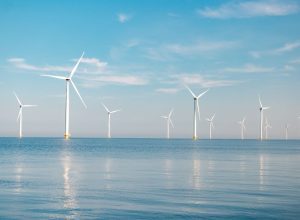NJ legislation aims to boost ‘clean’ accountability
 March 2024 — Proposed legislation on individuals’ rights to clean air and water could make it on the November ballot in New Jersey, with lasting impacts on economic development projects, particularly offshore wind.
March 2024 — Proposed legislation on individuals’ rights to clean air and water could make it on the November ballot in New Jersey, with lasting impacts on economic development projects, particularly offshore wind.
Coined the “green amendment,” the bill, if passed, would constitutionally guarantee the right to a clean environment. However, unclear enforcement measures have made it a contentious topic among advocates, such as environmental protection leaders and opposition groups, according to an APNews report.
New Jersey is among a growing number of states exploring this type of amendment. Montana, New York, and Pennsylvania have already enacted constitutional rights to a clean environment through similar amendments while an additional 15 states are either contemplating or expected to consider such measures soon, said Maya van Rossum, founder of Green Amendments For The Generations and head of the Delaware Riverkeeper organization in New Jersey, as cited by NBC 10 Philadelphia.
Concerns have been raised on how New Jersey’s bill could enable citizens to seek litigation if they feel their environmental rights are being violated, with Democratic state Sen. Linda Greenstein, a sponsor of the bill, noting lawmakers may need to add language spelling out how the law would work and be enforced.
“That means clean water to drink, clean air to breathe and enjoyment of our natural spaces, constitutionally guaranteed to every New Jerseyan today and tomorrow,” said Greenstein, as cited by NBC 10 Philadelphia. “These things should not be considered a privilege afforded to some.”
Given the state’s 130-mile-long coastline, environmental protection is a critical area that has an impact on everything from tourism and hospitality and economic development to the region’s emerging offshore wind sector.
In 2023, New Jersey’s offshore wind energy sails lost a bit of air after Danish wind developer Orsted terminated its two wind farms proposed for the state’s southern coast in October. Citing various challenges in addition to rising interest rates throughout much of 2022 and 2023, the company recorded $4 billion in impairment charges from the project cancellations.
However, the state’s plans to include offshore wind as part of its ambitious goal of achieving 100% carbon-free energy supply by 2050 remains intact. In January 2024, the New Jersey Board of Public Utilities (NJBPU) approved two offshore wind power projects with a combined capacity of 3,742-megawatts. According to the board, if those two projects are completed, they would bring about $6.8 billion in economic benefits to the state and provide enough energy to power around 1.8 million homes.
According to the Chamber of Commerce South Jersey’s newly released white paper on the region, wind energy was listed as the top policy suggestion for Salem County, noting that the industry presents the “best opportunity for economic development and job growth in decades with the establishment of the New Jersey Wind Port.”
Desired accountability through the proposed legislation could move the needle in New Jersey by addressing its nation-leading Superfund sites. Defined by the Environmental Protection Agency (EPA) as a place where “hazardous waste has been dumped, left out in the open, or otherwise improperly managed,” New Jersey had 115 Superfund sites listed on the EPA’s National Priorities List as of December 2023. Pennsylvania was second-highest at 90 sites followed by New York with 84. Examples include landfills, mining sites, processing plants and manufacturing facilities.
For more information, please visit:













